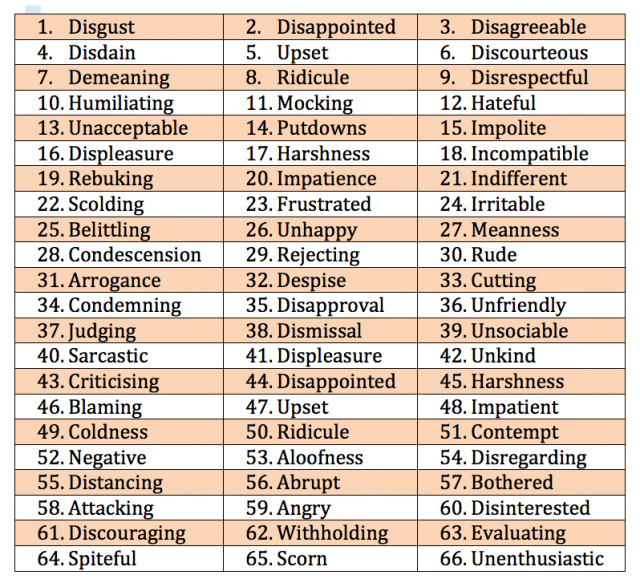Marriage: Drop the “EDGE”—A Journey into Graciousness
- November 2, 2018

Let’s be clear—I’m a recovering “edge-aholic”. I will be speaking out of a deep, insatiable and ongoing need to deal with my own lack of graciousness. I have often said when I’m speaking, that because of my ethnic roots, “I’m a brash Scotsman—like Brave Heart on steroids.” I tend to speak it straight, direct and yes, with an “edge”. As a card-carrying ‘type A’ personality I am personally driven and routinely assertive. If you were to cut open my character, you’d find by nature that I am critical, judgemental and impatient. I hate to have to admit it but it’s what I bleed. It’s clearly my fatal flaw. Imagine having to live with me. Sheesh!
But the first step toward any turnaround is admitting you have a problem. And I do.
You see, I can’t blame others for my “edge”. Nor should you. In my case, I have no hurts or abuse in my life story. No real rejections. I was loved, encouraged and supported by my family growing up. Some of you are saying “nice for you” but you find yourself with a really mixed bag of harmful baggage from your past. Look, I am not about to argue with you that your family of origin wasn’t dysfunctional or that you were not treated poorly along the way. But remember, though it wasn’t your fault for what you went through, it’s still your responsibility to face your hurts and deal with the resulting “edge”.
Let me repeat that for emphasis: “It’s not your fault but it is your responsibility!”
For me, I’ve come to see that my “edge” is more a reflection of the dark side of my personality coming out not some issue or hurt from my past. And without a doubt, this negative tendency is a daily reminder that I need Jesus desperately to win the battle over how I operate. My “edge” is never God’s way.
I don’t want to make the assumption we all know what “edge” is. Let me explain.
Here’s context first. The communication package of human interaction is made up three components: Body Language, Tone and Words. That makes sense. When people hear each other speak, of the 100% of the exchange, what percentage of the message do you think is made up of these three components? How much is Body Language? How much is Tone? What percentage do the Words make? Pick three numbers. Lock in your vote now. It will likely surprise some of you to find what sociological research shows.
Body Language is 55%, Tone is 38% and Words are only 7%! Wow! That’s crazy! It’s also why we coach couples to NEVER say anything negative in a text or an email. Dah…it’s only 7% of the message! Stop it! I digress.
So “Edge” is directly related to our TONE.That’s the 38% that is your attitude; the disposition you are coming across with. Technically, tone is read through the intensity, the accent, the rate or the inflection in your voice. It’s an expression of your mood or emotion. Tone is the intonation in your voice reflecting your temperament at that moment. With tone, the focus is not about what you are saying to someone but how you are saying it. And as manner, posture and facial expression are to body language, attitude, emotion and spirit are to tone. It’s how you come across to people; it’s what they are reading in your expression.
As such then, tone can either be positive or negative. Yet, having an “edge” is always a negative thing in human interaction. It takes down and destroys so many relationships,
How do you see the “edge” in your life? I know. You don’t have one. But for others reading this, let me point out that there are the blatantly obvious tones of negative interaction that we all think of like anger, harshness or meanness. There are also the more subtle tones of interpersonal exchange that we often don’t recognize as a problem like sarcasm, impatience and evaluating. Oh boy, now we’ve opened up a can of worms.
Get brave. Grab a pen. Evaluate YOUR “edge” on the EDGE CHART I have created. How do you sometimes come across? You are not allowed to rate your spouse. Circle any of the words that can apply to how you express your “edge”.
“EDGE” CHART: Circle the interaction attitudes that apply to YOU. How do you come across when communicating with those closest to you?
Now what do you think about how YOUR “edge” might be coming across? Look at the words you circled again. Do you make comments to stay one up on your spouse? Does your tone imply you are better than they are? Does your “edge” show that you are standing in judgement over them? Humbling isn’t it, if you are honest; sometimes even harder to admit for those who are not ‘type A’s’ and their negative disposition is less obvious.
Read through the following two lists of words and imagine how the tone of a marriage could be changed if the second list was followed.
List 1: Harsh, distancing, rejecting, abrupt, bothered and disinterested.
List 2: Warm, welcoming, accepting, patient, accommodating and engaging.
In couple’s therapy, I seriously try to help couples see the negative cycles associated with each having an “edge” toward the other.
What’s behind your “edge”?
The list could be long: anger, hurt, pride, resentment, insecurities, arrogance, unforgiveness, brokenness, fear and ah yes, personality too. That’s a full discussion for another time but for now, just start by asking yourself when you know you have an “edge” – ask WHY? Why am I speaking or responding in this way? And when answering, look inside. Don’t simply blame your past or your partner. Remember—I am aware of real hurts between people. I do marital triage. But though it may not be your fault, how you respond is still your responsibility!
What’s the result of an “edge”?
Having an “edge” instantly creates a wall. It’s an instant barrier of disapproval. It can distance us in a moment from the one we love. You see if you spend your time blaming, criticising, condemning, pointing out mistakes or shortcomings—face it—who would want to be with you??? When we speak down to our spouse, implying they’re wrong, incapable, stupid or worse, imagine where this stance is taking the relationship. The “edge” shows YOUR dysfunction.
I wish that I had recognized earlier in my marriage my need to address my “edge”. Over 20 plus years ago now, I committed to pray about and grow towards “graciousness”. Seriously, for one whole year—my primary prayer for my life was “Lord, Please make me into a gracious man.” I could see how my “edge” unaddressed was hurting Donalyn and the kids. Real change takes intentionality. Aim at change. Whatever it takes.
Instead of letting your dysfunctional “edge” wreak havoc on your most important relationships, why not try leaning in instead of leaning away. This step on intentionality changes everything in a marriage. Work to make an effort through love and graciousness instead of making a point through blaming and justification.
Seek to build a bridge rather than build a case.
You see, real love is felt in your ‘TONE’—the right tone—an others-centered tone. If you truly want to follow Jesus—check your “edge” at the door. See how 1 Corinthians 13:4-7 pretty much cancels every excuse for keeping your “edge”. “Love is patient and kind. Love is not jealous or boastful or proudor rude. It does not demand its own way. It is not irritable, and it keeps no record of being wronged. It does not rejoice about injustice but rejoices whenever the truth wins out. Love never gives up, never loses faith, is always hopeful, and endures through every circumstance.”
As if those verses weren’t enough, try to reconcile your “edge” with Colossians 3:12-15. “Since God chose you to be the holy people he loves, you must clothe yourselves with tender-hearted mercy, kindness, humility, gentleness, and patience. Make allowance for each other’s faults, and forgive anyone who offends you. Remember, the Lord forgave you, so you must forgive others. Above all, clothe yourselves with love, which binds us all together in perfect harmony. And let the peace that comes from Christ rule in your hearts. For as members of one body you are called to live in peace. And always be thankful.”
Face it. It will take more than raw courage and emotional intelligence to be able to make God-honouring changes in your “edge”. We will need the Lord to help us see our blind spots, own them responsibly and work to make the transformation needed. A self-absorbed, proud person will not look to the Lord and will simply go on blaming others and not experience the turnaround. Why not take the challenge of walking out the steps below?
Brave Steps to Drop the Edge
- Ask God to help you hear yourself. How are you coming across as you speak to others?
- Start listening to yourself? How are your words coming out? What’s your tone?
- Listen through the ears of the person you are talking to? Empathize. What is your tone saying to them?
- Note the listener’s reactions to your comment. Their face tells it all. Their words back to you convey to you how your “edge” may have impacted them.
- Remember, you can only change you so quit trying to change your spouse.
- Changing YOUR tone—dropping YOUR “edge— will 100% change the tone of your entire home and impact the nature of your most important relationships.
- Lean in to your spouse. Make an effort toward living out the LOVE CHAPTER in your interaction with others—especially those closest to you within your home.
Before you refer your spouse to this article, make sure you fully own your dark “edge” and start with an apology. Then, see if you can grow together. I would love to hear from you on your journey toward graciousness. I’m still on mine.
**NOTE: If you or someone close to you is in crisis, seek creditable support right away. Our Care Centre has a team of counsellors ready to help. We can counsel you in person if you are in the Fraser Valley or via phone or Skype if you live farther away.
To inquire about counselling or book an appointment, please fill out our Counselling Request Form, call our DFR message centre 604-556-1116 or email us at counselling@doingfamilyright.com
© Dr. Dave Currie – December 2018
Feature image used with permission by pexels.com


